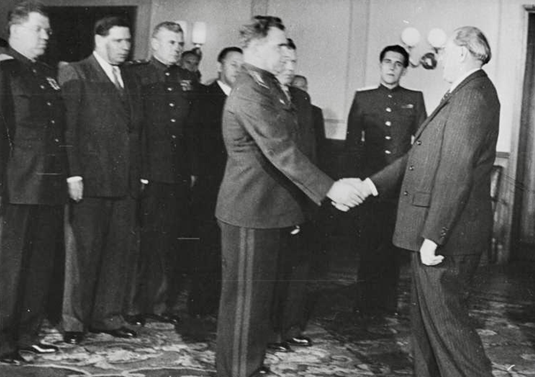Authentic Situational Awareness
- Sep 12, 2024
- 4 min read
Updated: Mar 9, 2025


Pictured: V.I. Chuikov, mid-1938. On the reverse side of the photo: signature of Marshal Chuikov from 25 December 1958, given to author Pavel Ilyich Fedorov
(1905–1983).
After completion of courses at the Military Academy for Mechanization and Motorization of the Red Army in 1936, Chuikov was assigned to command a brigade in Belarus that December. He was later promoted to the commander of Bobruisk Army Group (4th Army) of Belarus which occurred in June 1938. Vasily Ivanovich served in this last position for 5 months when he was called to give an account of his troops’ status. With the exception of a short stint with the 9th Army during the Russo-Finnish War, Chuikov commanded the 4th Army until December 1940, when he was deployed to service in China. Read more about his experiences leading the 4th Army here.
The events leading up to the review in late 1938 are well-known to many. Marc Jensen and Nikita Petrov, authors of Stalin’s Loyal Executioner: People’s Commissar Nikolai Ezhov 1895-1940, shared that Stalin decided to end the mass terror after nearly two years of political and military purges (1936-1938). The Politburo approved the joint resolution of the Council of the People’s Commissars and the Central Committee on 17 November 1938 to end the Great Purge. Historian James Harris posits that Stalin and other leaders “believ[ed] that they were always surrounded by capitalist enemies, always worried about the vulnerability and loyalty of the Red Army.”
A series of meetings with the Supreme Council under the People’s Commissar of Defense of the USSR took place from 21-26 November 1938, just after the end of the Great Purge. Numerous military officers, including Eremenko and Voronov, presented assessments on the results of the combat and political training of the Red Army. Chuikov also spoke on the evening of 23 November, sharing his concerns on various factors impacting the Red Army, including issues with the railway system:
“There is a feeling of great overinsurance in the troops, as a result of which many soldiers are taken away from combat training to guard even the houses of command personnel. We need to reconsider the guard system.
Troops are afraid to go out into the field in winter when the frost is more than 12-13 degrees. Experience has shown that there is nothing wrong with going out even at 20 degrees below zero, you just need to organize your work.
Combat training plans in units are being disrupted. It is necessary to cancel the monthly gatherings of company commanders to study the history of the party. The troops in 1938 received cartridges and shells late. The shooting ranges are poorly equipped. Processing of tactical tasks is not worked out comprehensively.
The construction of the "URa" [fortified area] is in jeopardy. There is no transport. We have received a narrow-gauge railway and rolling stock for it, but we cannot work, since we do not have a simple thing – crutches [railroad spikes – MK].
In combat units, horses are poorly used and they rely more on vehicles.
The courses for junior lieutenants paid off. Lieutenants of the first releases give good performance indicators. The recruitment system and norms for super-conscripts need to be revised because the best part goes to the courses for junior lieutenants and undesirable elements have to be left behind.”
In reflection of Chuikov’s honest assessment of troop conditions and readiness, a few items come to mind. Vasily Ivanovich knew well enough that Stalin was not seeking a “rose-colored view,” but a candid review and an authentic situational awareness report. Since Chuikov possessed an excellent work ethic and approached his tasks with seriousness, he was able to navigate difficult situations with professionalism. I suspect these characteristics, among other special qualities including his people skills and sincere loyalty to the Communist Party, kept him out of harm’s way when it came to Stalin’s watchful eye. The Stalinist purges represent a time of extreme duress which none of us will experience in our organizations, but Chuikov’s example serves to remind us that tending to the work put in front of us is the best course in challenging times.
In closing, Nikolai Kartashov's biographical work Vasily Chuikov includes the following personnel review which describes his outstanding characteristics effectively and demonstrates his authenticity:
"In the party organization of the headquarters of Bobruisk Army Groups since September 1938. During his stay in the party organization of the headquarters, Chuikov showed himself to be ideologically consistent and morally stable. There were no deviations or vacillations from the general line of the party, either in practical or in ideological-theoretical work.
Devoted to the LENIN-STALIN party and the socialist Motherland. For military services during the Civil War, he was awarded two Orders of the Red Banner. Politically developed well. A sensitive, sympathetic comrade. Actively participates in the party and political life of the party organization. He carries out the tasks of the party organization carefully.
Authoritative. Demanding. Energetic. Connected with the masses. He is working on his political growth. Elected a member of the bureau by secret ballot in May 1938 Bobruisk district committee of the All-Union Communist Party. Has no party penalties."
Party Bureau Secretary Mistenev
Deputy Beginning Political Department Battalion Commissar Slyusarenko



